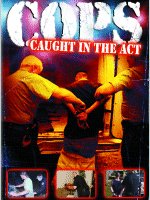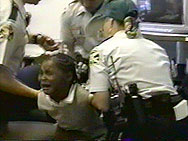I’ve already mentioned here why I think that (Ward Churchill|Hans-Hermann Hoppe) shouldn’t be fired, even though he’s demonstrably an ass. In the course of doing so, I mentioned off to the side a direction I didn’t think the argument should go–but things seem to be getting steadily worse, so it may be wortwhile to touch on it a bit more.
A lot of people seem to think that the reason to join the fight over (Churchill’s|Hoppe’s) remarks, and the threatened repercussions from his University employers, is to defend his First Amendment rights, or to defend free speech
from censorship
by (Evil Right-Wing Jingoistic Goons|Evil Left-Wing Thought-Police).
No it’s not.
Let’s start with censorship
. In the Roman Republic, the censor was a government official who, among other duties, was charged with safeguarding public morals (and had power to, for example, punish unmarried couples living together or land owners who did not keep up their property). Censorship
has expanded and shifted in its meanings since antiquity, but the one thing that all censors have had in common is: they are, one and all, government officials who use force backed by law to suppress free expression. Censorship is a government act, and like all government acts, it is ultimately backed by violent enforcement. (Don’t believe me? Try publishing a censored newspaper in, say, Singapore, and see what happens to you.)
Censorship is, properly speaking, government suppression of free speech. No more, no less. Of course, you might talk loosely about censorious
people or organizations without referring to any kind of government enforcement, but this is only a loose analogical usage. More to the point, it’s not the way you’re using the term when you say that the First Amendment bans censorship. All the First Amendment prohibits is invasive acts of government:
Congress shall make no law … abridging the freedom of speech,
or of the press; or the right of the people peaceably to assemble,
and to petition the government for a redress of grievances.
But that’s not what happening to Ward Churchill or Hoppe. There are lone nutcases calling for all sorts of retribution, of course, but nobody politically in a position to make a credible threat is claiming that Churchill or Hoppe should be fined by the government or thrown in prison or burned at the stake, and given that all of these things have been done to real people in the past, it’s a bit insulting to lump the late unpleasantness together with these victims of honest-to-God censorship. The worst that’s been suggested for either is losing his tenure and his job; mostly what’s been floated are administrative reprimands and punitive cuts in pay or position. It’s true that–in spite of the fact that Churchill’s and Hoppe’s remarks were complete claptrap–they shouldn’t have to face that. It would be foolish. It would be petty. It would be narrow-minded. But it wouldn’t be censorship.
So what’s wrong with it, then? Well, the problem in this whole debate is that two related, but importantly distinct issues:
Freedom of speech, in the sense of political freedom from censorship
Academic freedom, the ability to participate in scholarly discussion without repercussions from academic employers, even if your views are unpopular or controversial
People on both the Right and the Left run (1) and (2) together all the time, but the fact is that they’re completely different issues, and if we want to fight for them both (which we should) then we need to recognize that they’re different and why. Free speech in the sense of (1) means freedom from government coercion; it’s a good thing to have because if you don’t have it, what that means is at some point or another some goon is going to pick up a gun or a billyclub and use force or threats in order to keep you saying only what the government thinks you should say–which is tyanny, even if what you say is mistaken, ill-reasoned, foolhardy, or even hateful. That’s damned important to keep in mind and to act on; but there’s no call to act on it in this case, because Churchill and Hoppe aren’t being threatened with force by any government officer.
Academic freedom in the sense of (2), on the other hand, has nothing at all to do with freedom from coercion. If we intend to defend it in any kind of intelligent way, just pointing to the Constitutional and moral arguments for freedom of speech in the sense of (1) are going to be completely misplaced. Freedom of speech doesn’t mean being obligated to provide anyone with a microphone, and getting the government to force other people, against their will, to print or air views that they find repellant or keep employing the person who airs those views, is no less tyrannical than getting the government to force people not to print views or employ teachers that the government finds unsuitable.
That doesn’t mean that firing Churchill or Hoppe for his controversial (and stupid) views would be a good idea; it just means that it wouldn’t be a violation of his rights. Saying that academic freedom is different from free speech doesn’t mean that it isn’t very valuable. It is. But it’s valuable for different reasons. Specifically, it’s valuable because academic freedom in Universities is an essential part of a third value:
(3) Open debate, the encouragement of vigorous, wide-ranging, well-reasoned public debate
It’s hard to have open debate if even those who are paid to inquire and debate for a living are always afraid that they’ll lose their job or face retaliation from their employers for holding controversial views. Enforcing a party line is a damn good way to get bad research and timid debate. If you rule views you find odious out of bounds for discsussion before you even hear the arguments for them, then you’re not going to be able to make any serious effort at getting to the truth.
That’s why Churchill’s and Hoppe’s cases are important. Not because you need to defend to the death their right to say what you disagree with–the issue isn’t their right to say anything (which isn’t at issue) but rather their opportunity to make arguments for it in a civil forum without fear of reprisal from their Universities. Open debate is important to have if you want to make any serious progress for civilization or human freedom, and you can’t have that if you decide that, regardless of the quality of argument, you’re just not going to listen to, or acknowledge, certain people because you disagree with their conclusions.
But notice the difference from free speech here: the issue isn’t your right to say something, but rather your opportunity to get a hearing for your argument for what you say. It’s a very good thing for Universities (and, mutatis mutandis, other outlets for public debate) to consult, and publish, and vigorously discuss many substantively different views on the important issues of our day–but only in the context of reasonable standards of intellectual honesty, scholarly rigor, clarity, etc. Free speech doesn’t have any constraints of that sort–you have a right to say things that are glib, superficial, wildly dishonest, unargued, or belligerently stupid. The moral and Constitutional arguments for free speech are all for unlimited free speech; leaning on them when what you’re really trying to argue for is academic freedom
ends up as a call to artificially pump up the diversity of conclusions, without regard to the quality of the argument, in the name of defending the right
of opposing views to get a hearing. And that undermines the very goals of rational, informed discourse that academic freedom and open debate are meant to preserve.
The late unpleasantness is only the most dramatic illustration of a troubling long-term trend in the U.S.: major public opinion outlets (in the newsmedia and elsewhere), and increasingly even Universities, seem to have no qualms about neglecting, ignoring, or even blacklisting far too many people for having controversial opinions, without considering their arguments. But that’s not censorship; it’s foolishness, and dishonesty on the part of those who try to shut down discussion.
This isn’t just hypothetical grousing about bad arguments; the confusion has practical consequences that we see every day. Churchill’s defenders on the radical Left and Hoppe’s radical libertarian defenders aren’t the only people who have used these kind of arguments; it’s now a favorite of raving lunatics, Holocaust-denying weasels, and jingoistic politicians who have repeatedly used phony charges of censorship
in order to try to Mau Mau timid University bureaucrats into giving them a stage for their views whether or not those views are presented within any reasonable standards of intellectual honesty or scholarly rigor. Hacks like that ought to be ignored, denied a stage, and denied jobs at serious research Universities; there’s no censorship
involved in that. Churchill’s and Hoppe’s arguments were idiotic, but unlike (say) the fabrications of a David Irving or the mad-dog rampage of a David Horowitz, there’s no reason to say that they’re outside the standards of academic standards for argument or for teaching. That’s why it’s worth it to stand up for their academic freedom, not because they have some kind of right
to carry on however they please without being called to account.
When you equate the virtue of academic freedom with the right of free speech, you end up with calls for enforcement in law; the logical end-point of the the David Horowitz-David Irving gambit is phony free speech
legislation like Title VI or Horowitz’s own Academic Bill of Rights
–bills which try to use government force to tilt academic discourse in the name of increasing the numerical diversity of conclusions, out of misplaced free speech
concerns. That’s a direct assault on the idea of the University, and completely undermines all the reasons we have to say that open debate is worth having in the first place.
The (Churchill|Hoppe) fracas is important, but not because it’s a threat to free speech
or the First Amendment. It just ain’t, and if you keep pushing that line you’ll find yourself muddling the issue and travelling in some really unpleasant company. (And jeeze, Churchill and Hoppe are unpleasant enough on their own!)
 We already knew that
We already knew that  A lawyer has threatened to sue police officers who handcuffed an
allegedly uncontrollable five-year-old after she acted up at a
Florida kindergarten.
A lawyer has threatened to sue police officers who handcuffed an
allegedly uncontrollable five-year-old after she acted up at a
Florida kindergarten.